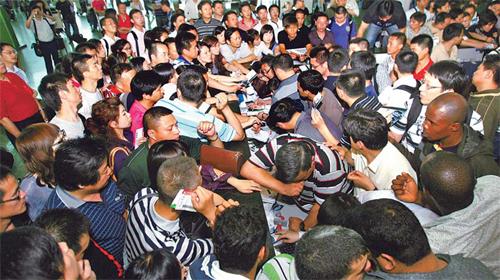
Passengers jostle each other as they struggle to book new flights at Baiyun airport on May 7 after a storm grounded all planes. [China Daily]
Li Jiaxiang, director of the Civil Aviation Administration of China (CAAC), said in an interview over the weekend that the measures include asking airlines to reserve 2 percent of their total capacity to deal with serious flight delays.
On busy routes, especially between three hubs - Beijing, Shanghai and Guangzhou - airlines should cancel flights that are expected to be delayed for more than four hours so that passengers can transfer to other flights.
Once flights are delayed for 30 minutes, airlines must tell passengers the expected take-off time along with the reasons for the delay.
Li also urged air traffic management to improve efficiency so that planes spend less time waiting to receive clearance for take-off.
The measures come after a number of high-profile incidents involving angry passengers over the past two months, which resulted in airport staff being injured and facilities being damaged.
In July, a group of Hainan Airlines passengers refused to board a plane delayed by seven hours. In the incident posted on the Internet, a senior member of the airline's staff had to kneel down and beg the passengers to get on board.
Also in July, two passengers at Chengdu Shuangliu international airport, incensed by their delayed flight, pushed airline staff out of a second-floor window, causing serious injuries.
Chen Si, 24, from Shanghai, said she flew three or four times this year and each time the flight was delayed for hours.
"It took me more time to travel by plane than by train and I never got a penny of compensation from the airlines," she said, adding that high-speed train is now her first choice of transport when she needs to shuttle between two cities.
Li told Xinhua News Agency there were more flight delays this year than in 2009, but extreme weather conditions, allied to other factors, were to blame, not the airlines.
Since January, the CAAC has adopted measures to reduce flight delays, including canceling flights that are delayed for more than four hours if the airline is to blame.
As a result of these measures, the percentage of delays caused solely by airlines in the first half of this year is less than that for the same period last year, he said.
According to the CAAC's rules, passengers only receive compensation from airlines when the airlines are responsible for the delays.
Insiders said many passengers felt they could be fooled by airlines which attributed delays to weather conditions to avoid paying compensation.
"Telling us the expected take-off time is better than before. But I am more concerned about knowing the real reasons for flight delays," said Fang Fang, a bank manager from Beijing.
Airlines are taking note. Earlier this month, China Eastern Airlines began dealing with insurance companies over compensating passengers for flight delays and there are concerns that schemes like this could result in passengers paying additional fees.
Zhang Qihuai, an aviation law expert, said that the CAAC should set up compulsory regulations on flight delay compensation.
On average, 80 percent of domestic flights take off on schedule and the punctuality rate is above the world average, Xia Xinghua, deputy head of the CAAC, said earlier this month, citing official statistics for the past five years.





